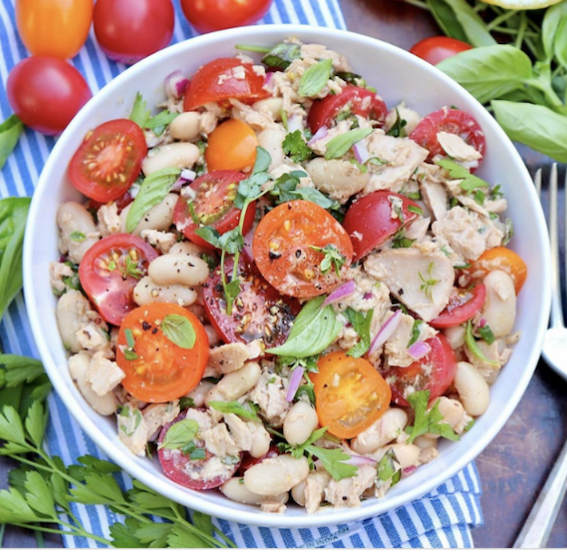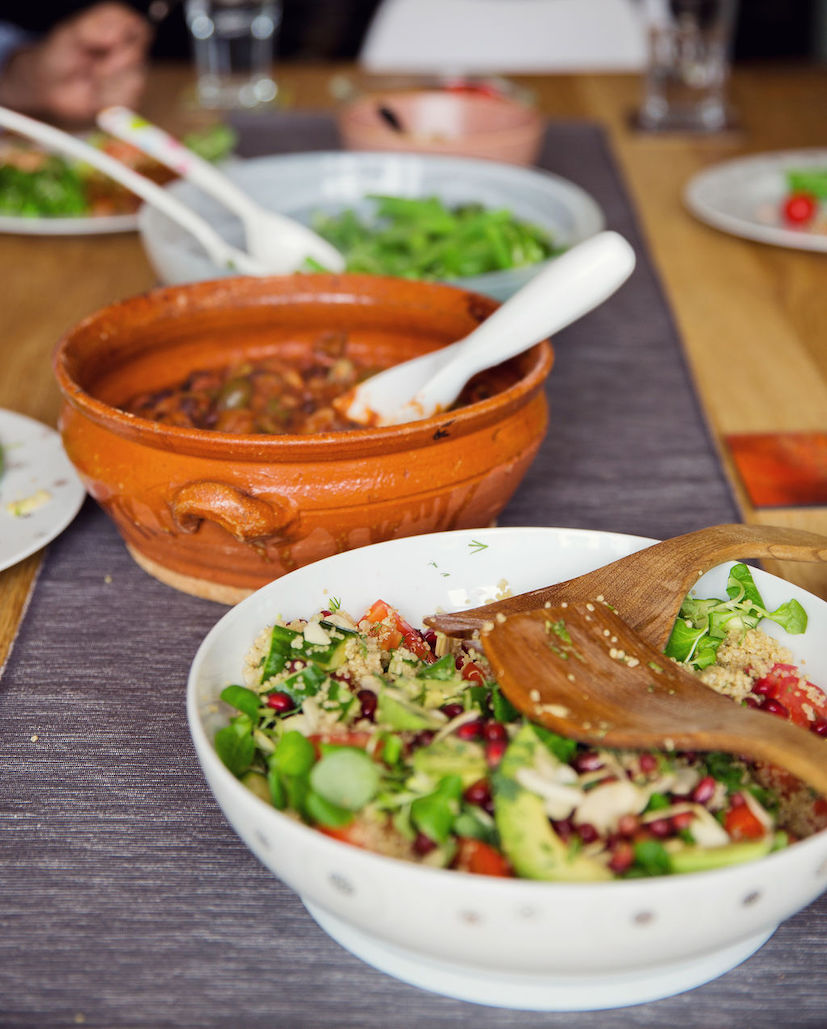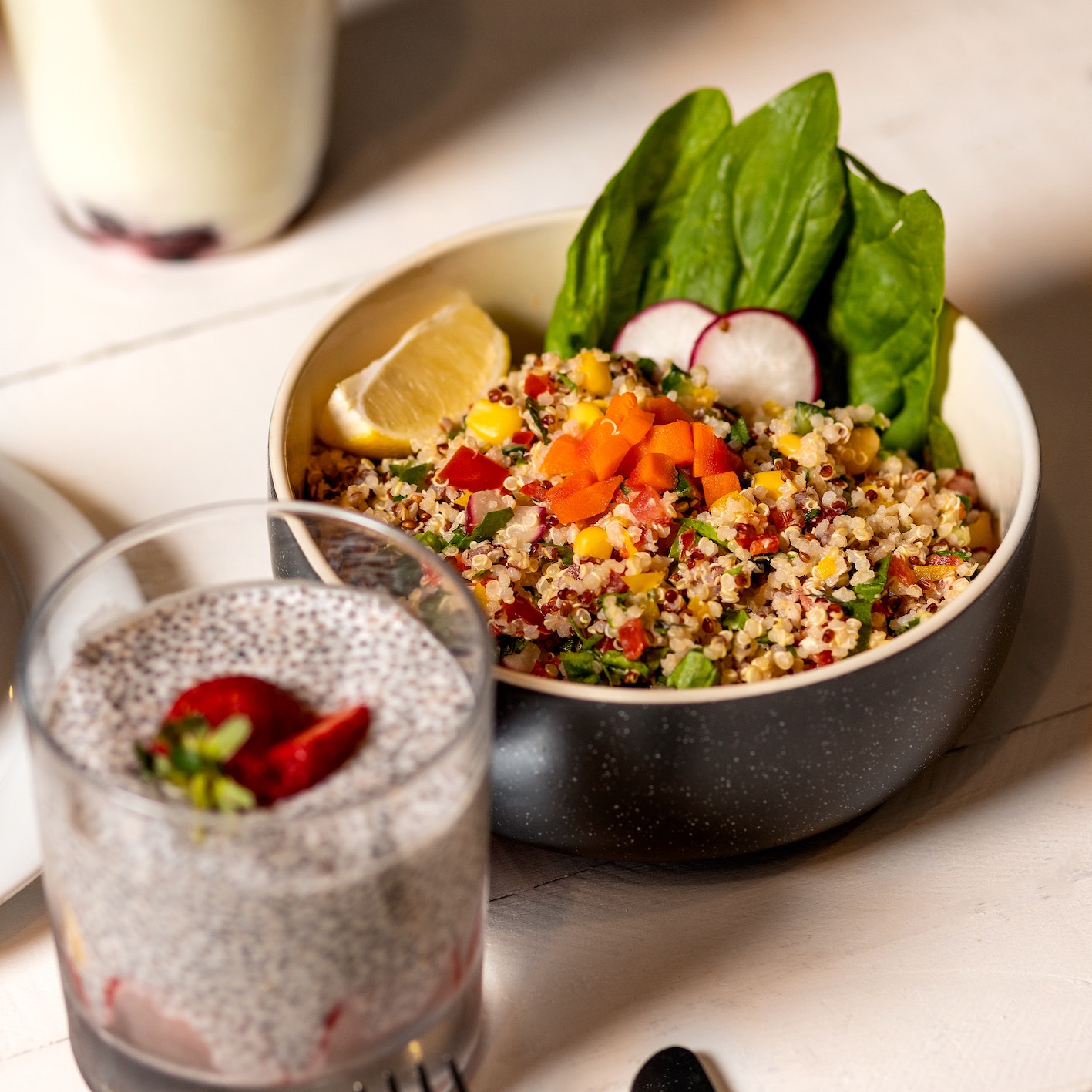
TUNA AND SOYA BEAN SALAD
This is a quick and easy lunch recipe that is packed with nutrients to support hormone health.
Soya or edamame beans are a fantastic source of phytoestrogens, which research shows may help symptoms when our oestrogen levels are bouncing up and down!
Plus, this is an excellent blood sugar balancing meal that will keep you fuller for longer.
Serves 2
Ingredients:
200g frozen soya beans
2 spring onions, thinly sliced
1 can of tuna, drained
Handful of fresh coriander or flat leaf parsley, leaves roughly chopped
12 olives
10 cherry/ plum cherry tomatoes, sliced
2 tbsp apple cider vinegar
2 tbsp extra virgin olive oil
Sea salt & pepper
2 large handfuls of mixed leaves/ rocket
Method:
1. Cook the soya beans in some boiling water for 6-7 minutes before draining.
2. Place the spring onions, tuna, herbs, olives, tomatoes and soya beans into a large bowl and, using a fork, break the tuna into flakes.
3. Drizzle the vinegar and olive oil over the salad, seasoning with sea salt and black pepper. Toss well.
4. Fold in the leaves before serving.
5. Enjoy!

When you think about mental health, you’re probably thinking about your brain and how that works. The picture is often much more complex. Hormones play a big part because these chemical messengers are the background to everything that happens in your body. How you feel, therefore, is not just psychological, it’s biological.
Did you know, there are a huge number of symptoms that are common to both depression and hormonal imbalance? These include low energy, dizziness, low mood, apathy, anxiety, irritability, anger, lack of enthusiasm, despair, headaches, poor concentration, feelings of hopelessness, lack of confidence, low libido, fuzzy brain, memory loss, and insomnia (although there are others).
Rebalancing your hormones naturally is not something that happens overnight, but it can be greatly improved with the help of nutritional and lifestyle change.
Mood and Cycle
Two of the main hormones that affect your feeling of mental wellbeing and clarity are oestrogen and progesterone, and these change throughout your menstrual cycle. It’s an over-simplification – but perhaps a helpful one – to think about oestrogen largely bringing positive effects to your mood and progesterone contributing more negative effects. With such a pronounced hormonal connection on mental health, it’s small wonder that women are twice as likely to suffer from depression than men.
According to the National Institute of Mental Health, 64% of women who suffer from depression say their symptoms get worse during the pre-menstrual period. Hormones are also likely to contribute to antenatal or postnatal depression, which affect around 10-15% of new mothers. And anxiety and depression are also starting to be recognised as symptoms of the perimenopause on top of hot flushes and night sweats.
How it works
At certain times in your cycle (in the run-up to ovulation), there will be lots of oestrogen in your system and women tend to feel brighter and better in their mood. You might even notice at this time you feel better at talking and articulating yourself. In the second half of your cycle, oestrogen dips, and progesterone comes into play. For some women, this can lead to lowered mood or depression.
You might already experience this as Pre-menstrual Syndrome (PMS), a very common condition linked to the changing levels of these hormones, that might include feelings of bloating, breast tenderness or headaches, or manageable emotional symptoms like irritability. For a small number of women (about 2-8%), the effect of these hormones on their mental wellbeing is pronounced. This is called Pre-menstrual Dysphoric Disorder (PMDD); an extreme form of PMS and one that, if you think might apply to you, you will want to ask your doctor about.
Why does this happen?
One of the first things to know is that the production of dopamine and serotonin (the two main brain chemicals associated with the development of depression and psychosis) is heavily linked to levels of oestrogen.
Research seems to suggest that there isn’t a noticeable difference in levels of oestrogen between those who are affected by mental health symptoms around their period or during the menopause – it seems some women are just especially sensitive to hormonal change, or perhaps also that lifestyle problems like stress may also play a big part.
Impact of hormones on blood sugar levels
Declining oestrogen levels have a role to play in insulin sensitivity (that means how sensitive – or not – the cells in your body are to the fat storage hormone insulin). In fact, a lack of sensitivity to insulin (or even being resistant to the effects of insulin) is lurking behind many of the common menopause symptoms, like hot flushes, fatigue and weight gain as well as symptoms of low mood like brain fog, anxiety and depression.
Hormones and mental health is a complex picture in which your physiological health and mental wellbeing are inextricably intertwined. It might be best to work with a nutrition practitioner to unravel this for you. We might be able to piece together a hormone balancing food and lifestyle plan to suit your circumstances. Get in touch if you feel you'd like to discuss this further.

How do you reward yourself? How do you comfort yourself when you are stressed? Think about that for a moment.
Rewarding yourself for your successes, both large and small, is a key part of staying motivated.
We are so time poor that rewarding ourselves with treat foods like cake and biscuits is the easiest way to show ourselves some self-love. And it’s the same for soothing ourselves if we’ve had a bad day.
My experience of running a nutrition clinic is that so little of what or why people eat has to do with nourishing their body. The far greater part is to do with how you feel about yourself and about life in general. Eating half a packet of chocolate biscuits is much easier than figuring out – not to mention getting – what you really need, which might be a way to de-stress, feel loved, get attention, kick back your heels and even sleep. Many people are almost completely out of touch with their own bodies.
When I’m working with clients, one of the big things we are trying to achieve is to develop a different relationship with food and, also, a different relationship with rewards.
Building in ways of making yourself feel good are essential for a number of reasons. Perhaps the biggest among them is that you need to positively reinforce the fantastic healthy changes you are making to encourage you to maintain them long term.
You need to build in more appropriate ways of making yourself feel better: far better to automatically choose to spend five minutes relaxing in the sunshine in the garden to recharge your batteries than to grab a handful of biscuits.
Most of our rewards are habit. They are conditioning. Chances are, you have been conditioned to reward yourself with food, often from early childhood.
Normal ‘rewards’ are short lived and usually followed by recriminations. If you truly want lasting change, you need to find ways of regularly getting that feel-good feeling from other things. You’ll want to build in more appropriate ways of making yourself feel better and look forward to non-food related treats.
I encourage my clients to build up a list of non-food treats to avoid any feelings of deprivation. After a while, you will prefer these rewards and benefit from them far more than food treats that simply create other problems for you later.
Regular ‘me time’ is important here as our lives are very busy and many of us have got into the habit of relying on food to give us a quick pleasure fix. But, as we know, this ‘reward’ is short lived and usually followed by disappointment plus a large serving of guilt! If you truly want lasting change, you need to find ways of regularly getting that feel good feeling from other things. We all deserve and need time to do positive things for ourselves - without feelings of guilt.
Improving our relationship with food is all about changing behaviours. We know that the carrot is more effective than the stick for long-term, self-motivated change. So, as well as deciding on your big rewards for achieving long term goals, think of a few quick and easy things you can do at least 3 times every week.
So, as an example, you might be better to CHOOSE to spend 5 minutes relaxing in the sunshine in the garden to recharge your batteries than to grab a handful of biscuits.
It can be a really empowering exercise to take a look at what you might normally do to reward yourself and think, are these appropriate now or do I need to replace them.
Most of the time it’s a simple as putting in a new habit to replace the old one. And, even better when the new habit is one that you really enjoy! All this is good for your physical and mental health.
Spend some time to identify some activities that you can build into your daily life that you enjoy and can use as your reward / destressor / way of taking a break / or just to have 5 minutes of indulgence or peace!
What would you like to spend more time doing? What would make you feel good?
What would help you relax or de-stress?
A few examples:
Add your own: think of at least 5 things that relax you...
Bored vs reward?
Most people can identify with eating when they were really bored. This often leads to mindless eating just to experience that sugar rush to give you a temporary high. Or it may simply be that you need something to occupy your mind and hands as a distraction technique. If you recognise yourself doing these things, then this is a great opportunity for you. It actually means that you are looking for something fun / exciting / interesting to add into your life. Use this as an opportunity to improve the quality of your life and build in new ways of enjoying yourself and enriching your experience of life.
Simple steps to better rewards
What are your personal interests? What activities do you enjoy?
What do you enjoy? What would you like to try? If you know this is something you want to improve on, it's worth spending a little time writing a list (in a notepad or on a phone rather than keeping it conceptually in your head). Choose one and have it as one of your goals for this week.
And if you’d like some help, why not book in a call with me here?

Is your IBS driving you crazy?
Bloating, gassy, cramps, heavy, uncomfortable? One minute you can’t go to the loo and the next minute you can’t get off it?
The likely cause is Irritable Bowel Syndrome (IBS). It’s incredibly common. According to Guts UK, a charity set up to promote awareness of and funding for digestive problems, it affects up to a third of people at some stage or another and it is one of the main reasons people visit their doctor.
Unfortunately, according to the NHS, there’s not a lot you can do. The official view is that it’s a lifelong problem that no one really understands and that there’s no cure for (although over-the-counter medicines can help symptoms). So sorry, move along and deal with it yourself.
As nutrition professionals will tell you, there IS hope. A consultation with a nutrition professional specialising in digestive health will be able to, in the first instance, provide some natural solutions that are likely better than taking over-the-counter medication AND your nutritionist will be able to work with you to find the root cause. This will enable you to get to the bottom of what is causing the symptoms of IBS (excuse the pun), and then you can take steps to fix it.
One of the most common causes of IBS is SIBO (small intestinal bacterial overgrowth), which accounts for 60##plus## of IBS cases. This describes a condition where bacteria manage to to grow and thrive in the small intestine. It’s not a question of ‘good’ or ‘bad’ bacteria. There shouldn’t really be many there at all.
It might be that you have a lactose intolerance. This is when your body is not able to tolerate lactose, a type of sugar found naturally in milk and other dairy products, leading to a host of ‘IBS symptoms’. It might similarly be fructose malabsorption. Again, some people are not able to absorb fructose and symptoms are very similar to lactose intolerance.
Dysbiosis is an imbalance in the levels of beneficial (good) and pathogenic (bad) bacteria in the large intestine or colon, potentially caused by the overuse of antibiotics or alcohol, an increase in high sugar diets, and stress.
Or you might have a yeast overgrowth. Simply, the gut environment gets out of balance (due to dysbiosis) such that unwelcome yeast can thrive.
None of these are pressing issues for regular doctors because there is often not the NHS testing or the framework for treatment of these problems. In some cases, digestive problems can be tricky to solve, and it almost always involves a lot of detective work. But if your symptoms are hampering your life in a significant way, I want you to know that there ARE things you can do. Although IBS might be very common, it is not normal to experience the symptoms you do.
What can I do about my IBS now?
There are some simple tricks you can put into practice today and that might make enough of a difference to help you get your life back on track. I’m going to tell you what they are in a moment.
I also want you to consider the degree to which your symptoms bother you. Are you satisfied with just covering up the symptoms and hoping for the best? That might be enough for you. If it isn’t, please book yourself in for a free 30-minute digestive health call to get an idea of what you can do right away and what might be possible for you.
10 ways to improve your digestion
The following suggestions are very basic but surprisingly effective at improving symptoms of digestive distress.
DO
DON’T
If you’re sick of feeling bloated, gassy, crampy or going to the loo too much (or too little), book in for a free 30-minute digestive health mini consultation. You can do that by clicking here.

My top tips for a health Veganuary
January is a great time for changing up habits and trying new things. The excesses of Christmas are over, and the New Year brings new beginnings. It’s the perfect opportunity to try out something different. And over the last few years, one of the most popular January dietary changes has been Veganuary, where people try out an exclusively plant-based diet for the month.
But, if this is a new step for you, how can you ensure that you are doing this healthily? Here are my top tips for having a fun and healthy month trying out a new way of eating:
1. Don’t forget to eat a variety of foods
Do you find yourself always buying the same sort of veg each week? Well, then this is an opportunity to get out of that rut! Try adding in new vegetables and vegan ingredients to your shopping trolley. Or think about possibly signing up for a veg delivery this month. This will push you out of your comfort zone and make you mix up what you cook.
If you’re trying veganism as a new way of eating, it’s important that you don’t just continue eating your normal meals without the meat or fish. This is the perfect opportunity to try a whole new batch of recipes – with vegetables as the stars of the show. By having a wide variety of foods will help to ensure that you’re getting a good nutritional balance.
2. Cook from scratch
Don’t be fooled into thinking that because it’s vegan and packaged up with healthy styling that processed vegan foods are any healthier. While it’s tempting to reach for the pre-packaged vegan foods as a quick fix, take care, as they may not be any better for you than non-vegan pre-packaged foods.
For example, vegan biscuits may have just as many processed ingredients and sugar as non-vegan biscuits. By cooking from scratch, you can ensure that you are able to stay away from the not-so-healthy processed ingredients and that you can keep your nutrition levels high. Snacks such as carrot sticks and hummus or celery with guacamole are good quick and easy alternatives.
3. Discover new sources of plant-based protein
Getting enough protein is often an area that people worry about when embarking on a vegan diet. There are plenty of ways to include protein in your vegan diet, but it’s a good idea to vary the sources and try and include one or two different sources at each meal to ensure you are getting a full complement of protein.
Tofu, tempeh, and edamame, as well as certain grains like quinoa and amaranth, are vegan sources of complete protein. Another good idea is to combine grains and pulses together which then can also provide a good source of complete protein. For example, eating wholegrain rice and beans together, or having a pitta bread with some hummus.
Leafy greens, lentils, chickpeas, and other legumes are good sources of plant-based iron. However, plant-based (or non-haem iron) is not so readily absorbed by us as iron from animal sources. To ensure that you get as much as you can from your vegan source, try to make sure that you eat vitamin C-rich foods, such as broccoli, peppers, kiwis, and citrus fruits, alongside your plant-based foods to aid absorption.
Vitamin B12 is not produced by plants and, according to research, fortified foods or supplements are the only proven reliable sources of it for vegans. For example, vitamin B12 is often added to yeast extract, alternative milk products and nutritional yeast flakes and, therefore, it might be a good idea to include these sources in your diet on a daily basis. Or you may want to talk to your healthcare provider regarding supplementation.
Our main source of vitamin D is from the sun but, in the UK from October-May, the government guidelines recommend supplementation. But, it is always a good idea to check with your healthcare provider before embarking on supplementation. Dietary vitamin D largely comes from oily fish or dairy products. However, it can also be found in some vegan fortified foods, such as alternative milk products and orange juice.
Oily fish, like salmon and mackerel, are the best sources of two omega 3 fatty acids – DHA and EPA – which are important for eye and brain health. However, they can be made in the body from precursor ingredients found in plant foods like flaxseed, walnuts, and soy. So, be sure to include these foods in your new plan on a daily basis.
If this is something that you’d like to try, then do check out some new and interesting recipes. Check out the recipes section of the blog. Or feel free to book in a call with me to discuss – I’d be happy to help!

Roasted Broccoli and Tahini Hummus Quinoa Bowl
Serves 1
Ingredients:
100g cooked quinoa – always great to have in the fridge (or cheat with a pouch)
200g broccoli, chopped into florets large handful spinach
1 large, cooked beetroot, sliced
5 walnuts, coarsely chopped
1 tbsp tahini
2 tbsp hummus
1⁄2 lemon cut into wedges
Method:
![]()
Please get in touch and find out more - I offer a free 30-minute exploratory call.